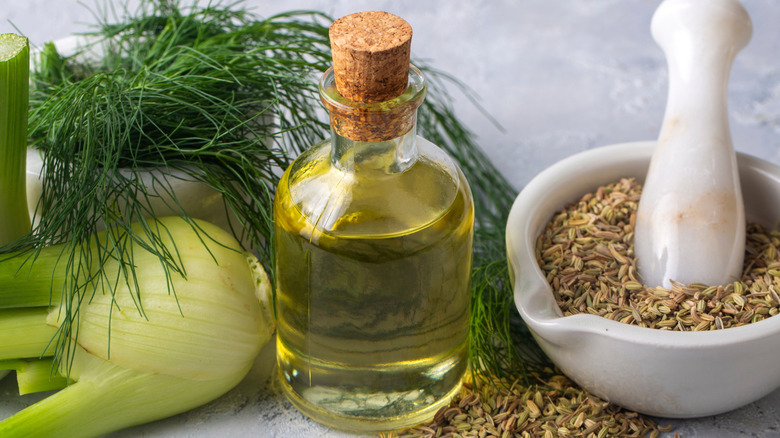A Mediterranean Vegetable That's High In Potassium Can Lower Cholesterol And Blood Pressure At The Same Time
The Mediterranean diet is sometimes misunderstood to be about eating gyros or sipping ouzo. While those foods are part of Mediterranean cuisine, the Mediterranean diet itself focuses on whole, nutrient-dense foods. This heart-healthy eating plan emphasizes unprocessed or minimally processed foods like fruits, vegetables, whole grains, legumes, nuts, and seeds. It also encourages cutting back on saturated fats from animal products and instead getting healthy fats from sources like olive oil, nuts, and avocado. (Read how the Mediterranean lifestyle can help you live longer.)
One vegetable commonly enjoyed in the Mediterranean region is fennel, and it's easy to see why it fits so well into this nutrient-rich eating pattern. A single fennel bulb has just 73 calories, less than a gram of fat, and provides nearly a third of your daily recommended intake of vitamin C. And if you're watching your carbs, fennel can still be a smart choice. The fact that it has 7.3 grams of fiber means it has fewer than 10 grams of net carbs. And that fiber also plays a role in supporting heart health by helping to lower cholesterol.
Fennel may also benefit your blood pressure, but not because it's low in sodium. Fennel delivers a generous 969 milligrams of potassium, a mineral that helps your body maintain a healthy sodium balance. Including more potassium-rich foods like fennel in your diet can be a helpful step toward better blood pressure control.
Fennel's effect on blood pressure and cholesterol
You may have walked past fennel in the produce section, reaching instead for familiar greens like spinach or romaine lettuce for your salads. But fennel is worth a second look. It has the crisp texture of celery and a mild licorice-like flavor. Although it's in the same plant family as carrots, it's closely related to herbs like dill, caraway, and anise.
Potassium-rich fennel may support healthy blood pressure levels, but potassium may not be the only mechanism to reduce blood pressure. A 2013 study in Natural Product Communications examined the effects of fennel oil and coriander oil on the angiotensin-converting enzyme (ACE), which plays a role in raising blood pressure. Both oils were found to inhibit ACE activity and showed strong antioxidant effects, suggesting they could help support overall heart health.
Fennel also contains soluble fiber, which plays a key role in lowering cholesterol. This type of fiber binds to cholesterol in your digestive tract, preventing it from being absorbed into the bloodstream. It also helps eliminate bile from your body, prompting the liver to draw more cholesterol from the blood to produce new bile, ultimately lowering blood cholesterol levels.
A 2011 study in The Egyptian Journal of Hospital Medicine tested fennel's effects in rats fed a high-fat, high-cholesterol diet. The rats that received fennel had lower cholesterol levels and showed signs of improved health compared to untreated rats, pointing to fennel's potential role in managing cholesterol.
How to add fennel to your daily menus
Fennel has a texture similar to celery, but it might not be your go-to for dipping in ranch. Its black licorice flavor isn't for everyone, so it's probably better used as a flavor booster in your favorite dishes. Think of fennel as a way to add a fresh, natural twist to meals. It pairs especially well with citrus, garlic, and olive oil, so keep that in mind when you're experimenting in the kitchen. Model and TV host Brooke Burke infuses fennel in her water to stay hydrated.
Since it's a staple in the Mediterranean diet, fennel naturally complements fish. If you have a juicer, one option is to juice fennel stalks to make a light vinaigrette for baked fish. You can also thinly slice the bulb, toss it with olive oil and lemon, and roast it over fish for a bright, aromatic flavor. Or try braising fennel as a side dish with preserved oranges, white wine, and garlic. Another simple idea is to sauté thinly sliced fennel in olive oil, then add capers, parsley, lemon zest, and a splash of lemon juice. You can also try this recipe for poached salmon and fennel salad.


